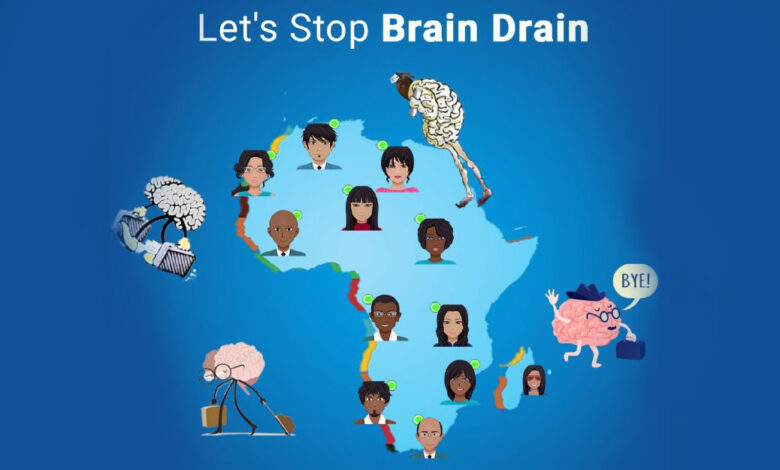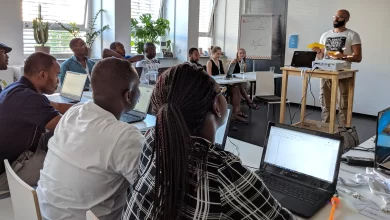African Increasing rate of Brain-Drain and Telemigration Opportunities
Can Teleworking opportunities help Africa address the problem of brain-drain?

Over 200 years ago, the world experienced a revolution in economic activities that brought a new era in the wake of 1800. A period that left a remarkable impact on how people lived and the way businesses operated. That period is called the Industrial Revolution, which saw a shift from the agrarian economy to a manufacturing economy where products were no longer made solely by hand but by machines leading to increased productivity.
Prior to the revolution, most English and Americans made their living in farming and lived in widespread rural areas. However, with the advance of factories, people began working for companies located in urban areas and were earning higher wages than people in farming.
This brought a massive migration of rural dwellers to urban areas with the hope of getting a better life and later became a pattern of life for people to always seek to migrate to places where life promises better meaning as it were.
AFRICAN BRAIN-DRAIN
With an already established pattern of migration for greener pastures, African youths were not left out. In their numbers, young people started migrating to America and Europe; two continents that had more to offer and were more industrialized than Africa.
In economics, such a movement, where the workforce of a country emigrates or migrates to another country or territory in search of better living conditions normally for better job opportunities, higher wages and other work conditions, is referred to as Brain-Drain.
Yes, African brain-drain has been on the increase as most countries in Africa are still struggling to provide basic infrastructure and a favorable business climate to encourage more industries that will provide the needed jobs to engage their youths.
A recent report by World Bank puts it that every year 12 million young people enter the job market while only 3 million formal jobs are created and that it will require Africa to create about 15 million additional jobs yearly to close the unemployment gap already created especially as the continent population is expected to double and reach 2.5 billion people by 2050, a mixed blessing if not managed will lead to a great tsunami in the African economic trajectory.
The good news is, that there seems to be a way out.
THE CONCEPTS OF TELEMIGRATION AND TELEWORKING
The term Telemigration was created in 2019 by Richard Baldwin, professor of international economics in Geneva, in his essay “The Globotics Upheaval: Globalization, Robotics and the Future of Work”. Professor Richard examined the impact of globalization and technological advances on employees and workers with reference to industry 4.0, he defines telemigration as a system that allows people belonging to one country to work in the offices of another country. So a telemigrant is a person who lives in another country usually a developing country while working for a company located in a country usually a developed country.
On the other hand, according to Wikipedia, Teleworking is an employment arrangement in which employees do not commute to a central place of work, such as an office building, warehouse, or retail store. It is facilitated by technology such as collaborative software, virtual private networks, conference calling, videotelephony, internet access, cloud computing, voice over IP (VoIP), mobile telecommunications technology such as a Wi-Fi-equipped laptop or tablet computers, smartphones, and desktop computers. Teleworking platforms like Microsoft Team, Zoom, Slack, Telegram etc, help to facilitate the work of a telemigrant across the globe while platforms like Talenteum are helping to connect the remote job opportunities.
TELEMIGRATION AND BRAIN-DRAIN IN AFRICA
The African Union agenda 2063 Goal 1 is expected to provide a general increase in the standard of living, quality of life and well-being for all Africa’s citizens with key priorities including; improvement of incomes, provision of jobs, and decent work for Africans geared towards alleviating poverty, inequality, and hunger. This goal is linked to goal 2 of the same agenda 2063 which is to aspire to have well-educated citizens and a skills revolution underpinned by science, technology, and innovation to help Africa fight the current problem of skill gap and youth unemployment through a skill revolution that is focused in education, science, technology, and innovation (STI).
Yet evidence has shown that Africans who end up getting STI skilled end up emigrating their countries to pursue lucrative socio-economic opportunities with the hope of a better living creating a problem of brain-brain for most African countries as the continent is left without the critical skills needed to address the numerous developmental gaps Africa faces. For instance, in great numbers, Africa has been losing skilled academics, engineers, scientists, medical doctors, nurses, accountants, etc to Europe and America leaving the continent handicapped to tackle its internal challenges.
And here comes what seems to be a way out, teleworking opportunities or remote jobs where African young skilled talents are allowed to work for foreign companies while in the comfort of their homes without having to emigrate. This is indeed addressing the problem of brain-brain in Africa and yes it can do more when rightly maximized.
Follow my series on brain-drain and teleworking to read what Africa must do to maximize this opportunity further.
My name is Faith Nwaobia (Dr.), a pan Africanist and social entrepreneur leading a youth-focused social enterprise Youthup Global. I write regularly on LinkedIn.
.




